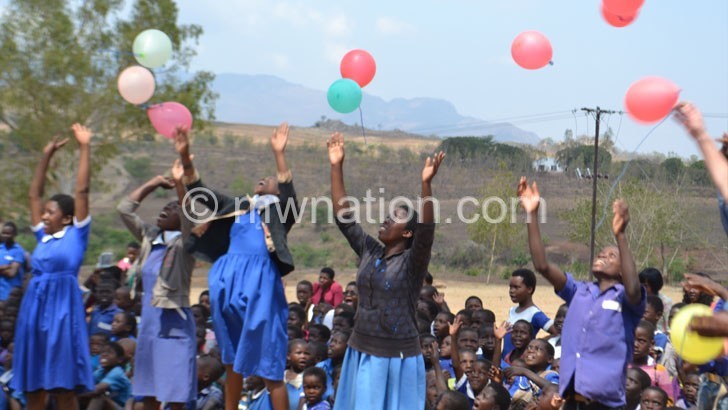Mary’s Meals celebrates feeding one million children in Malawi
Mary’s Meals, an international charity organisation, on Wednesday celebrated the success of its school feeding programme in Malawi having reached out to one million children since 2002.
Speaking during the celebration at Chiraweni Primary School in Traditional Authority (T/A) Kapeni in Blantyre, Mary’s Meals International chief executive officer Janet Haugh expressed delight over the impact of the programme in Malawi as it has helped to keep children in school, improved their classroom performance as well as the health status of the children.

Said Haugh: “The impact is that we see a smile on the face of every child. Primary school enrollment has improved and a great number of girls now attend school.
“I feel privileged to be part of this, and we wish to reach out to more so that every child should be able to receive a meal at the place of their education.”
Haugh called for more donations for the programme to be able to reach out to more children.
According to Mary’s Meals school feeding manager Noel Mtingwi, in Malawi, the programme is run in over 800 schools providing maize and soya porridge locally known as likuni phala, fortified with essential vitamins and minerals.
“It is well structured; we work in collaboration with the teachers and the communities themselves. We also provide technical knowhow to ensure safety and hygiene in the schools where this programme is being implemented,” he said.
Mtingwi hinted that stakeholders are appreciating the impact of the programme and more schools are coming forward requesting to be included in the programme.
Representing the primary education advisor (PEA) for Lunzu Zone, head teacher for Mtenjere Primary School Rose Mdulamizu thanked Mary’s Meals for the programme which she described as a relief to needy pupils.
Said Mdulamizu: “My plea is that Mary’s Meals continues to receive the support it needs so that it is able to reach out to every needy child.”
The programme is being implemented in 17 countries across Africa, Asia, Latin America, Eastern Europe, and the Caribbean.





